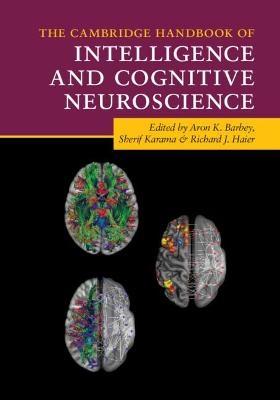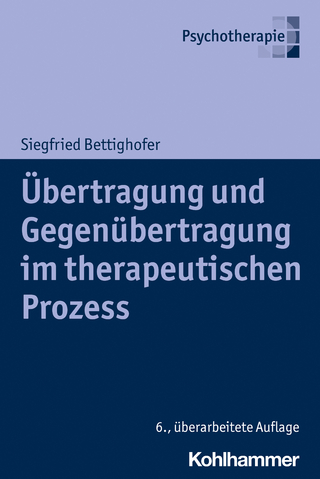
The Cambridge Handbook of Intelligence and Cognitive Neuroscience
Cambridge University Press (Verlag)
978-1-108-72772-3 (ISBN)
This handbook introduces the reader to the thought-provoking research on the neural foundations of human intelligence. Written for undergraduate or graduate students, practitioners, and researchers in psychology, cognitive neuroscience, and related fields, the chapters summarize research emerging from the rapidly developing neuroscience literature on human intelligence. The volume focusses on theoretical innovation and recent advances in the measurement, modelling, and characterization of the neurobiology of intelligence differences, especially from brain imaging studies. It summarizes fundamental issues in the characterization and measurement of general intelligence, and surveys multidisciplinary research consortia and large-scale data repositories for the study of general intelligence. A systematic review of neuroimaging methods for studying intelligence is provided, including structural and diffusion-weighted MRI techniques, functional MRI methods, and spectroscopic imaging of metabolic markers of intelligence.
Aron K. Barbey is Professor of Psychology, Neuroscience, and Bioengineering at the University of Illinois at Urbana-Champaign. He directs the Center for Brain Plasticity, the Intelligence, Learning, and Plasticity Initiative, and the Decision Neuroscience Laboratory at the Beckman Institute for Advanced Science and Technology. Sherif Karama is a psychiatrist with a PhD in neuroscience and Assistant Professor in the Department of Psychiatry of McGill University. He also completed a five-year postdoctoral fellowship in Brain Imaging of Cognitive Ability Differences at the Montreal Neurological Institute. Richard J. Haier is Professor Emeritus in the School of Medicine at the University of California at Irvine, and Editor-in-Chief of Intelligence, a scientific journal. He received the Lifetime Achievement Award from the International Society for Intelligence Research (2020).
Part I. Fundamental Issues: 1. Defining and Measuring Intelligence – The Psychometrics and Neuroscience of G Thomas R. Coyle; 2. Network Neuroscience Methods for Studying Intelligence Kirsten Hilger and Olaf Sporns; 3. Imaging the Intelligence of Humans Kenia Martínez and Roberto Colom; 4. Research Consortia and Large-Scale Data Repositories for Studying Intelligence Budhachandra Khundrakpam, J B Poline, and Alan Evans; Part II. Theories, Models, and Hypotheses: 5. Evaluating the Weight of the Evidence – Cognitive Neuroscience Theories of Intelligence Matthew J. Euler and Ty L. McKinney; 6. Human Intelligence and Network Neuroscience Aron K. Barbey; 7. It's About Time – Toward a Longitudinal Cognitive Neuroscience of Intelligence Rogier A. Kievit and Ivan L. Simpson-Kent; 8. A Lifespan Perspective on the Cognitive Neuroscience of Intelligence Joseph P. Hennessee and Denise C. Park; 9. Predictive Intelligence for Learning and Optimization – Multidisciplinary Perspectives from Social, Cognitive and Affective Neuroscience Christine Ahrends, Peter Vuust, and Morten L. Kringelbach; Part III. Neuroimaging Methods and Findings: 10. Structural and Diffusion-Weighted Imaging of Intelligence Erhan Genç and Christoph Fraenz; 11. Structural Neuroimaging of Intelligence Differences Stefan Drakulich and Sherif Karama; 12. Functional Brain Imaging of Intelligence Ulrike Basten and Christian J. Fiebach; 13. An Integrated, Dynamic Functional Connectome Underlies Intelligence Jessica R. Cohen and Mark D'Esposito; 14. Biochemical Correlates of Intelligence Rex E. Jung and Marwa O. Chohan; 15. Good Sense and Good Chemistry: Neurochemical Correlates of Cognitive Performance Assessed in Vivo through Magnetic Resonance Spectroscopy Naftali Raz, Jeffrey A. Stanley; Part IV. Predictive Modeling Approaches: 16. Predicting Individual Differences in Cognitive Ability from Brain Imaging and Genetics Kevin M Anderson and Avram J Holmes; 17. Predicting Cognitive-Ability Differences from Genetic and Brain-Imaging Data Emily A. Willoughby and James J. Lee; Part V. Translating Research on the Neuroscience of Intelligence into Action: 18. Enhancing Cognition Michael I. Posner and Mary K. Rothbart; 19. Patient-Based Approaches to Understanding Intelligence and Problem-Solving Shira Cohen-Zimerman, Carola Salvi, and Jordan Grafman; 20. Implications of Biological Research on Intelligence for Education and Public Policy Kathryn Asbury and Diana Fields; 21. Vertical and Horizontal Levels of Analysis in the Study of Human Intelligence Robert J. Sternberg; 22. How Intelligence Research Can Inform Education and Public Policy Jonathan Wai and Drew H. Bailey.
| Erscheinungsdatum | 01.06.2022 |
|---|---|
| Zusatzinfo | Worked examples or Exercises |
| Verlagsort | Cambridge |
| Sprache | englisch |
| Maße | 176 x 253 mm |
| Gewicht | 958 g |
| Themenwelt | Geisteswissenschaften ► Psychologie ► Psychoanalyse / Tiefenpsychologie |
| Naturwissenschaften ► Biologie ► Humanbiologie | |
| Naturwissenschaften ► Biologie ► Zoologie | |
| ISBN-10 | 1-108-72772-7 / 1108727727 |
| ISBN-13 | 978-1-108-72772-3 / 9781108727723 |
| Zustand | Neuware |
| Informationen gemäß Produktsicherheitsverordnung (GPSR) | |
| Haben Sie eine Frage zum Produkt? |
aus dem Bereich


